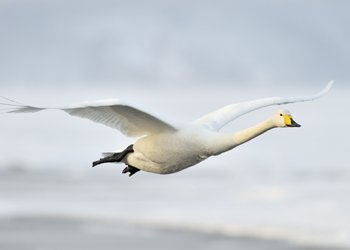The Royal Society for the Protection of Birds has piped up with concerns about fracking for shale oil and gas in Lancashire over fears for local wildlife.
The nature group is worried the drilling technique – cracking open shale rock deep underground with a highly pressured mix of water – could pose a risk to an “internationally important” protected area for pink footed geese and whooper swans (pictured). Both of the birds are rated ‘Amber’ status by the RSPB, its second most critical rating for bird species which need some sort of conservation action to support them.
The charity has lodged a letter of objection with Lancashire County Council about a proposed drilling site at Singleton near Blackpool which is close to this protected area. It is also opposed to the firm Cuadrilla Resources’ work in Balcombe which has dominated the headlines because of local protests.
Harry Huyton, RSPB head of climate and energy policy said: “Singleton in Lancashire is right in the heart of the North West and is on the doorstep of an area which is home to thousands of geese and swans who will arrive from as far away as Siberia to roost and feed next month and stay for the winter.
“There may not be as many local residents as in Sussex, but this area is protected by European law because it is so valuable for wildlife and Cuadrilla has done nothing to investigate what damage their activities could do to it,” he added.
Cuadrilla Resources has consistently defended its activity and said it has carried out all the necessary requirements to test for shale gas and oil in the UK.
The bird charity’s comments over the weekend came just after the Church of England dipped a toe into the fraught shale gas debate.
Philip Fletcher, who deals with mission and public affairs for CofE warned against “viewing fracking through a single issue lens”, suggesting the UK should avoid “blanket opposition” to new fuel sources which could relieve the problem of fuel poverty.
He said: “There are a number of balancing considerations which need to be taken into account when coming to a view. Fuel poverty is an increasingly urgent issue for many in society – the impact on energy bills is felt most by the least well off. Blanket opposition to further exploration for new sources of fuel fails to take into account those who suffer most when resources are scarce.”





